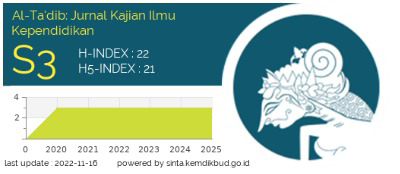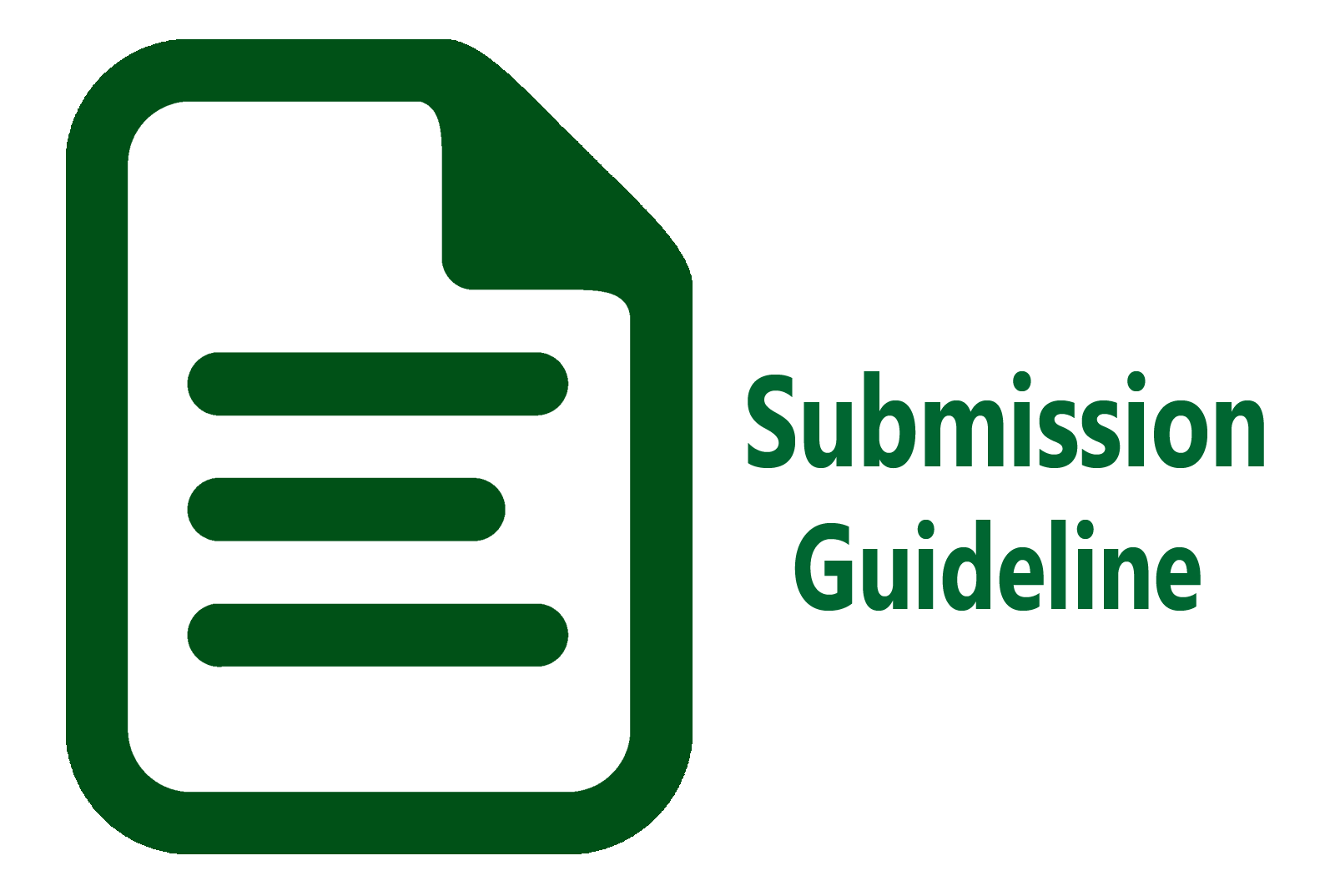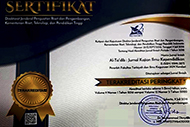Integrasi Program Tahfidz dengan Sekolah Formal di Pondok Pesantren Anak
Abstract
This article aims to present the analysis of the integration of the tahfidz program with formal schools in the Islamic boarding schools focusing on the Holy Qur'an memorization in East Java, Indonesia. This phenomenology study used data gathered from interviews, observation and documentation. The results of data analysis indicate that the model of the integration of the tahfidz program from Islamic boarding schools into the madrasah ibtida'iyyah (MI) curriculum is done by adding Qur'anic subjects to the Hadith with the allocation of two lesson hours per week which also requires students to memorize the Qur'an in accordance with the target to support the tahfidz program in Islamic boarding schools. It is also found that the the advantages of the tahfidz program integration model is to accelerate students' ability to memorize because of the similarity of the tahfidz method used as well as the presence of additional subjects in the curriculum that support the tahfidz program.
Full Text:
PDFReferences
Apriati, Y. (2020). Kerjasama sekolah dan orangtua dalam proses pendidikan tahfidz Al-Qur’an pada anak di sekolah tahfidz plus SD Khoiru Ummah Banjarmasin. Padaringan: Jurnal Pendidikan Sosiologi Antropologi, 2(1), 164–173.
Badruzaman, D. (2019). Metode tahfidz Al-Qur’an di Pondok Pesantren Miftahul Huda II Kabupaten Ciamis. Idea: Jurnal Humaniora, 2(2), 245–253.
Bahruddin, A. H., Mujahidin, E., & Hafidhuddin, D. (2017). Metode tahfizh Al-Qur’an untuk anak-anak pada Pesantren Yanbu’ul Qur’an Kudus Jawa Tengah. Ta’dibuna: Jurnal Pendidikan Islam, 6(2), 162–172. https://doi.org/10.32832/tadibuna.v6i2.1062
Chotimah, C., Rifai, A., & Prihatin, T. (2018). The management of the tahfidz Al Qur’an education program in children tahfidh Yanbu’ul Qur’an Islamic Boarding School Kudus. Educational Management, 7(1), 39–45.
Embong, R., Rahman, A. A. A., Ibrahim, M., Abdullah, R. T., Adam, F., Omar, S. H. S., Wahid, N. A., & Omar, N. A. C. (2017). Integrated education as a solution for educational dualism from Said Nursi’s perspective. People: International Journal of Social Sciences, 3(2), 914–928. https://doi.org/10.20319/pijss.2017.32.914928
Goensch, I. (2016). Formal school or Koranic school? Determinants of school type choice in Senegal. Oxford Development Studies, 44(2), 167–188. https://doi.org/10.1080/13600818.2015.1119262
Hidayah, N. (2016). Strategi pembelajaran tahfidz Al-Qur’an di lembaga pendidikan. Ta’allum: Jurnal Pendidikan Islam, 4(1), 63–81. https://doi.org/10.21274/taalum.2016.4.1.63-81
Ma’zumi, & Jakaria. (2012). Contributions of madrasah to the development of the nation character. International Journal of Scientific & Technology Research, 1(11), 37–39.
Miles, M. B., Huberman, A. M., & Saldana, J. (2014). Qualitative data analysis (3rd ed.). New York: SAGE.
Piliang, M. Z., Daulay, H. P., & Siddik, D. (2017). An analysis of integrated Islamic school Al Ulum in Medan, Indonesia. IOSR Journal of Humanities and Social Science, 22(4), 100–107. https://doi.org/10.9790/0837-220406100107
Purwati, N., Zubaidah, S., Corebima, A. D., & Mahanal, S. (2018). Increasing Islamic junior high school students learning outcomes through integration of science learning and Islamic values. International Journal of Instruction, 11(4), 841–854. https://doi.org/10.12973/iji.2018.11453a
Rahmi, Y. (2019). Metode muraja’ah dalam menghafal Al-Qur`an di Pondok Pesantren Al-Mubarok Tahtul Yaman Kota Jambi. Innovatio: Journal for Religious-Innovation Studies, 19(1), 65–76. https://doi.org/10.30631/innovatio.v19i1.78
Rikardo, R. (2020). Pembelajaran tahfidz Al-Qur’an di Pondok Pesantren Tahfidz Nurul Qur’an Pondok Kelapa Kabupaten Bengkulu Tengah. An-Nizom, 5(1), 33–37.
Rohman, A. (2016). Dimensi-dimensi psikologis tahfidz Al-Qur’an pada anak-anak (Studi tentang tahfidz Al-Qur’an anak-anak di Pesantren Yanbu’ al-Qur’an Kudus Jateng). Jurnal Intelegensia, 4(2), 78–112.
Sistupani. (2017). Metode tahfidz Al-Qur’an pada pendidikan anak usia dini. Perspektive, 10(1), 1–16.
Supian, Vahlepi, S., & Sholiha, M. (2019). Strategi pemotivasian dalam pembelajaran tahfizh al-Qur’an. Tarbawy: Indonesian Journal of Islamic Education, 6(2), 176–186. https://doi.org/10.17509/t.v6i2.19679
Thorburn, M., & Stolz, S. A. (2020). Understanding experience better in educational contexts: The phenomenology of embodied subjectivity. Cambridge Journal of Education, 50(1), 95–105. https://doi.org/10.1080/0305764X.2019.1632798
Wahyuni, A., & Syahid, A. (2019). Tren program tahfidz Al-Qur’an sebagai metode pendidikan anak. Elementary: Jurnal Ilmiah Pendidikan Dasar, 5(1), 87–96. https://doi.org/10.32332/elementary.v5i1.1389
Yuli, N. G., Haningsih, S., & Adikrishna, R. (2011). The common room design of Islamic boarding school: A preliminary research in Yogyakarta Islamic boarding school. International Jornal of Engineering & Technology, 11(4), 156–163.
DOI: http://dx.doi.org/10.31332/atdbwv13i2.1134
Refbacks
- There are currently no refbacks.
Copyright (c) 2020 Ngabdul Faqih

This work is licensed under a Creative Commons Attribution-NonCommercial-ShareAlike 4.0 International License.
| Indexing: |










